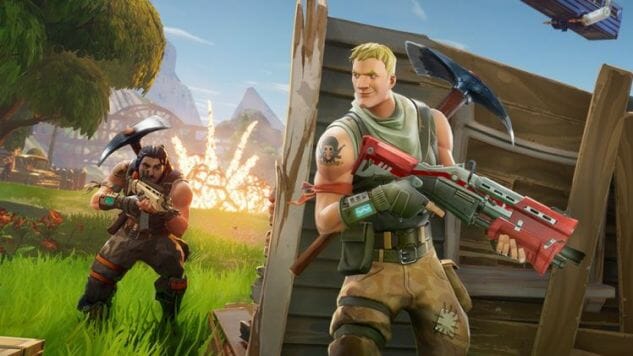
The setup has become commonplace: a hundred players drop onto a large plot of land (generally an island) littered with weaponry and various implements of mayhem, and then duke it out to be the last player standing on an ever-shrinking play area. What was once a popular mod concept has ballooned into an entire genre, with multiple titles duking it out on the sales charts to become the top-played battle royale game in the world.
The worlds depicted in battle royale games tend to be stark, usually focused on a fictional war-torn region (as seen in PlayerUnknown’s Battlegrounds and H1Z1) or fanciful, completely non-analogous spaces (as seen in Fortnite: Battle Royale and upcoming Paladins: Battlegrounds). The more “realistic” battle royale games emphasize the survival aspects of their mechanics, and many of them were spinoffs of previous multiplayer survival games, most notably DayZ, the mod-turned-game phenomenon that placed players in the zombie-infested coastline of Chernarus.
Without a doubt, battle royale games are selling a specific fantasy, one that isn’t wholly unique. Games have, for years, thrived using fantasies of being “one man against the world,” and before hundred-player servers were technologically feasible it was the realm of single-player games to offer that feeling.
It’s different now, though, and for one major reason: other people.
The fantasy of a battle royale game isn’t just in the survival (which generally is downplayed, due to shorter matches than “traditional” multiplayer survival games) but in the dominance, the carnivorous drive to outplay your opponents in life and death. The fantasy is being able to see a figure in the distance and kill them before they can kill you.
To be clear, I’m not saying that battle royale games are unique in this, or that they are somehow contributing a heretofore unknown level of violence to the gaming ecosystem, but there is the inescapable reality that the rise of battle royale games comes in parallel to rising inequalities on the global stage.
Virtual games of king-of-the-hill competition inadvertently (or advertently) tell a narrative of the most capable rising to the top. It’s the bedrock of their success as a genre—everyone comes into the game with the same character skills and depends on their own abilities as a player to make it to the end. The winner’s circle can only hold one player at the end. It’s a meritocratic simulation, in other words. With all else being equal, the player with the most skill rises to the top.
The de facto term for these games (and the one I’m using here) is “battle royale,” a term borrowed from the 1999 novel of the same name by Japanese writer Koushun Takami. In the book, the “battle royale” scenario is between third-year high school students, dropped onto a remote island by a fascist government and forced to kill their fellow classmates. Many aspects of Battle Royale made their way verbatim into PlayerUnknown’s Battlegrounds, including the idea of “forbidden zones”—areas that participants are killed in if they stay too long (PlayerUnknown’s Battlegrounds also added a series of skins that looked to be conscious nods to the influence of Battle Royale).
Battle Royale the book had its own descendants in the literary world (Hunger Games is often cited, in dismissal or approval, as taking many cues from Koushun Takami’s work) but games have undoubtedly taken the concept to a new audience. Notably absent from the battle royale genre, however, is the commentary on the greater society that Battle Royale (the book) hinged on.
There is little, if any, description of the worlds outside of Miramar or Erangel in PlayerUnknown’s Battlegrounds, and Fortnite: Battle Royale does not linger long on any reason why the formerly survival-focused heroes of Save The World-mode would suddenly take up arms against the last humans on the planet.
Obviously, much of this is due to the games’ focus—they are not meant to be much other than a perfect simulation of a massive, player-vs-player shootfest, and in that they succeed. But it comes at the cost of what made Battle Royale such an intriguing world. In the pursuit of perfect killing, we have lost the reason behind it.
I am a big fan of battle royale games, for the most part. I think they actualize something that many gamers had been looking for for a very long time. The adrenaline rush of taking out another player, knowing that doing so has effectively wiped all the progress they have made in the match, and the constant fear of the same happening to you is an attraction fairly unique to the genre. But it’s built on a fantasy that hits a little too close to home, and without critiquing the world that they situate themselves in, can be read as an endorsement of the horrors that would build such a world.
Dante Douglas is a writer, poet and game developer. You can find him on Twitter at @videodante.